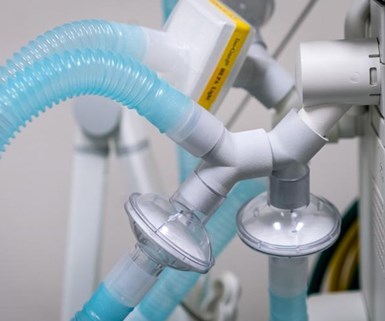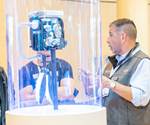3D Printed Device Allows Multiple Patients on One Ventilator
Emergency authorization from FDA allows for use of device permitting four patients to use a shared ventilator. HP involved in mass production via additive manufacturing.
Prisma Health, a not-for-profit health company administering 18 hospitals in South Carolina, announced it has received emergency use authorization from the U.S. Food and Drug Administration (FDA) for a ventilator expansion device allowing a single ventilator to support up to four patients at once during times of acute ventilator shortages such as those being seen and anticipated with the COVID-19 crisis.

The new 3D printed VESper device for expanding ventilator capacity is the Y-shaped fitting near the center of this image. Photo: Prisma Health.
Stephanie Hendrixson and I discussed emergency research and development efforts around devices to "split" ventilator tubes so multiple patients can share a single ventilator in a video posted yesterday. This is a controversial move that would not be contemplated in a normal medical situation.
The new device, which the company is calling "VESper," is a Y-shaped fitting for ventilator tubing that allows for appropriate filtering of bacteria and viruses in the tubing, the company says.
The device will be mass-produced via 3D printing. The announcement from Prisma Health named HP as its manufacturing partner. HP is the developer of 3D printing technology specifically aimed at scale production. (Not the case with all 3D printers. Examples of manufacturers using the HP platform for production are here, here and here.) The Prisma announcement cited HP’s Digital Manufacturing Network, a distributed network linking 3D printers in different locations, as a resource able to allow production to quickly scale up.
However, 3D printing specifications will also be made available for producing the device on 3D printers outside this network. Hospitals can register to receive these specifications at prismahealth.org.
Related Content
-
Video: 5" Diameter Navy Artillery Rounds Made Through Robot Directed Energy Deposition (DED) Instead of Forging
Big Metal Additive conceives additive manufacturing production factory making hundreds of Navy projectile housings per day.
-
3D Printed Titanium Replaces Aluminum for Unmanned Aircraft Wing Splice: The Cool Parts Show #72
Rapid Plasma Deposition produces the near-net-shape preform for a newly designed wing splice for remotely piloted aircraft from General Atomics. The Cool Parts Show visits Norsk Titanium, where this part is made.
-
Beehive Industries Is Going Big on Small-Scale Engines Made Through Additive Manufacturing
Backed by decades of experience in both aviation and additive, the company is now laser-focused on a single goal: developing, proving and scaling production of engines providing 5,000 lbs of thrust or less.















